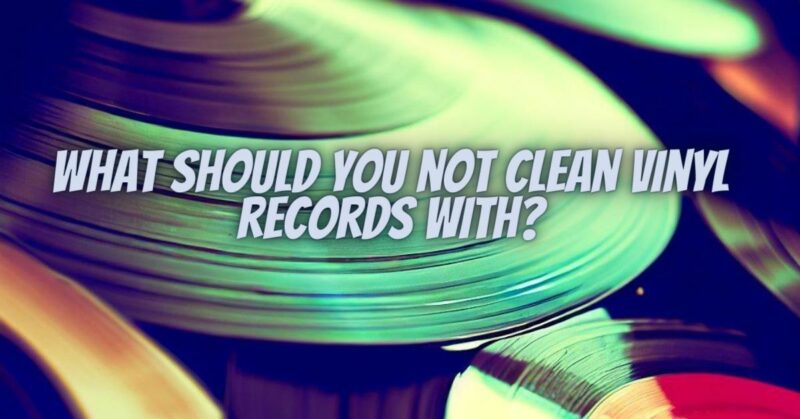Vinyl records are treasured for their warm, analog sound and the tactile experience they provide. To maintain their audio quality and extend their lifespan, proper cleaning is essential. However, not all cleaning methods and solutions are suitable for vinyl records. In this insightful article, we will explore what you should never use to clean vinyl records to avoid potential damage and deterioration.
- Tap Water:
Tap water is a common household cleaning agent, but it’s not suitable for cleaning vinyl records. Tap water often contains minerals and impurities that can leave deposits on the record’s surface, resulting in pops, crackles, and potential long-term damage. Additionally, using water alone may not effectively remove oils, fingerprints, or stubborn dirt from the vinyl.
- Rubbing Alcohol:
Rubbing alcohol, also known as isopropyl alcohol, is a solvent commonly used for cleaning various surfaces. However, it should not be used on vinyl records. Alcohol can damage the vinyl’s surface and alter its chemical composition, potentially causing it to become brittle and prone to cracking. It can also dissolve the grooves and damage the labels.
- Household Cleaners and Detergents:
Household cleaners and detergents, such as dishwashing soap or multipurpose cleaners, are designed for general cleaning purposes and are not appropriate for vinyl records. These cleaners often contain harsh chemicals that can harm the vinyl’s surface and degrade its sound quality.
- Acetone or Nail Polish Remover:
Acetone and nail polish remover are strong solvents designed for specific tasks, such as removing nail polish. These substances are too abrasive for vinyl records and can cause irreversible damage to the vinyl’s surface. They can also remove labels and markings.
- Abrasive Materials:
Never use abrasive materials like scouring pads, abrasive brushes, or rough cloths to clean vinyl records. Scratching the surface of a record can result in permanent damage and negatively impact sound quality.
- Paper Towels and Tissues:
Paper towels and tissues may seem harmless, but they are not suitable for cleaning vinyl records. Their fibers can easily scratch the vinyl surface and leave behind lint or paper residue.
- Unverified Cleaning Solutions:
Avoid using cleaning solutions that are not specifically designed for vinyl records. While there are many commercial record cleaning solutions available, using unverified or homemade concoctions can introduce unknown chemicals or agents that may harm your records.
Proper Vinyl Record Cleaning Solutions and Tools:
- Anti-static brushes: Designed to remove dust and reduce static electricity.
- Vinyl record cleaning brushes: Soft bristle brushes designed for gentle dry cleaning.
- Microfiber cloths: Soft, non-abrasive cloths for both dry and slightly damp cleaning.
- Dedicated record cleaning solutions: Commercially available solutions formulated for vinyl records.
- Record cleaning machines: Professional-grade machines that provide thorough cleaning and extraction of contaminants.
Preserving the quality of your vinyl records requires careful consideration of cleaning methods and solutions. Avoid using tap water, alcohol, household cleaners, acetone, abrasive materials, paper towels, tissues, and unverified cleaning solutions. Instead, opt for safe and effective cleaning tools and solutions specifically designed for vinyl records. By following proper cleaning practices, you can ensure that your vinyl collection remains in excellent condition, providing you with years of musical enjoyment.


